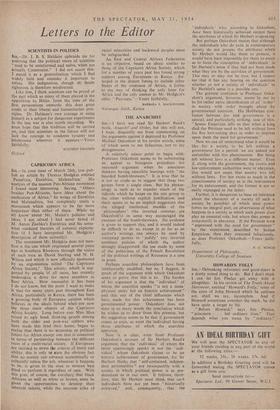THE ANARCHIST
SIR,—1 have not read Sir Herbert Read's boOk, Anarchy and Order, but this will' not,
hope, disqualify me from commenting on the arguments against it deployed by Protestor Michael Oakeshott in his review article, some of which seem to me fallacious, not to say disingenuous.
A relatively minor point to begin with: Professor Oakeshott seems to be substituting an appeal to bourgeois prejudices for reasoned argument when he associates thinkers having anarchist leanings with " the bearded bomb-throwers." It is true that he is not so crude as to suggest that these two groups form a single class. But his phrase- ology is such as to transfer much of the ridicule which he heaps on the one group to the other without explicit justification; and there seems to be an implicit suggestion that the alleged intellectual muddle of the ' philosophers ' (the inverted commas are Oakeshott's) in some way encouraged the excesses of the bomb-throwers. No evidence is given to support this, and it would indeed be difficult to do so, except in so far as an author's writings can always be used by interested parties to ' justify' (my inverted commas) policies of which the author strongly disapproved: the use made by some of the politicians of the French Revolution of the political writings of Rousseau is a case in point.
Perhaps anarchist philosophers have been intellectually muddled; but so, I tuggest, is much of the argument with which Oakeshott seeks to prove that this is so. The burden of his argument is that the ' individual ' of whom the anarchist speaks " is not a meta- physical entity but an historic achievement" and that one Of the chief influences which have, made for this achievement has been governmental power. Oakeshott does not state in so many words the conclusion which he wishes us to draw from this premise, but the suggestion seems to be that if government ceases to exist, so must the individual having those attributes of which the anarchist 'approves.
Now it is clear, even from Professor Oakeshott's account of Sir Herbert Read's argument, that the ' individual' of .whom the latter approvingly speaks is not the ' indi- vidual' whom Oakeshott claims to be an historic achievement of government, for Sir Herbert thinks that " self-contained, indepen- dent personalities " are incompatible with a society in which political power is as pre- dominant as in our own. It follows, there- fore, that Sir Herbert must think that such individuals have not yet been " historically achieved," and, consequently, that the ' individuals ' who, according to Oakeshott, have been historically achieved cannot have the attributes of which Sir Herbert is speaking.
But perhaps Oakeshott means that although the individuals who do exist in contemporary society do not possess the attributes which Sir Herbert would like them to possess, it would have been impossible for them so much as to form the conception of individuals ' in 'Sir Herbert's sense if they had not been made what they are by the activities of government. This may or may not be true, but 1 cannot see that it has any bearing on the question whether or not a society of ' individuals ' in Sir Herbert's sense is a possible one.
The greatest confusion in 'Professor Oake- shott's argument, however, seems to me to be his rather naïve identification of all ' order' in society with order brought about by governmental coercion. His 'Hobbesian con- fusion- between law and government is a special, and particularly striking, case of this. "Sextus Empiricus tells us that when a king died the Persians used to be left without laws for five hair-raising days in order to impress upon them the need for government."
New we can all understand what it would be like for a society to be left without a government for a period: we are indeed not unfamiliar with this phenomenon. But being left without, laws is a different matter. Even if, along with the government, the courts and law-enforcement authorities were in abeyance, this would not mean that society was left without laws. For law exists as much in the consciousness of society as in the instruments for its enforcement, and the former is not so easily expunged as the latter.
Further, it is dangerous to base an inference about the character of a society (if such a society be possible) of which state power forms no integral part, on observation of what happens in a society in which such power does play an essential role, but where that power is temporarily in abeyance. If the Persians were "impressed with the need for government" by the experiment described by Sextus Empiricus, then they reasoned falladiously, as does Professor Oakeshott.—Yours faith- fully,
University College of Swansea


































 Previous page
Previous page